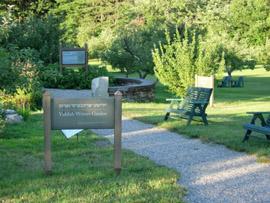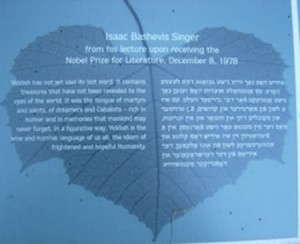54. Part 4: The Yiddish Writers’ Garden: travelogue
Before I proceed, I would like to offer a little information on the Yiddish language. The most basic description would be a mix of Hebrew and medieval German with a smattering of other languages. It was spoken by the Jews of central and eastern Europe.
The photos show the outside of the National Yiddish Book center, which houses over a million Yiddish books that were rescued from extinction. It also is a cultural center where Jews from all over the world come to experience their culture.
The outside is lovely; a path leads one to a contemplative retreat. A pond with falling water and beautiful plants pays homage to the many Yiddish writers who have been and who still are. Plaques with a poem or piece of their work line the path. As one stops to read with the sound of flowing water and birds singing nearby, one cannot help but feel moved.
I would like to honor 2 Yiddish writers for Poetry Wednesday.
Isaac Bashevis Singer
from his lecture upon receiving the Nobel Prize for Literature
December 8, 1978
Yiddish has not yet said its last word. It contains
treasures that have not been revealed to the eyes of the
world. It was the tongue of martyrs and saints,
dreamers and Cabalists–rich in humor and in memories
that mankind may never forget. In a figurative way,
Yiddish is the wise and humble language of us all, the
idiom of frightened and hopeful humanity.
God of Mercy
Kadia Molodowsky
O God of Mercy
Choose-
Another people.
We are tired of death, tired of corpses.
we have no more prayers.
Choose-
Another people.
We have run out of blood
For victims.
Our houses have been turned into desert.
The earth lacks space for tombstones,
There are no more lamentations
Nor songs of woe
In the ancient texts.
~Translated by Irving Howe
CommentChronological Reverse Threaded
|
froggies67 wrote on Sep 17, ’08
I thank you for shareing this,the yiddish Book center isbeautiful,the grounds are lovely,I love the writings also thanks again, I am learning so much from you my friend!
|



Comments
54. Part 4: The Yiddish Writers’ Garden: travelogue — No Comments
HTML tags allowed in your comment: <a href="" title=""> <abbr title=""> <acronym title=""> <b> <blockquote cite=""> <cite> <code> <del datetime=""> <em> <i> <q cite=""> <s> <strike> <strong>